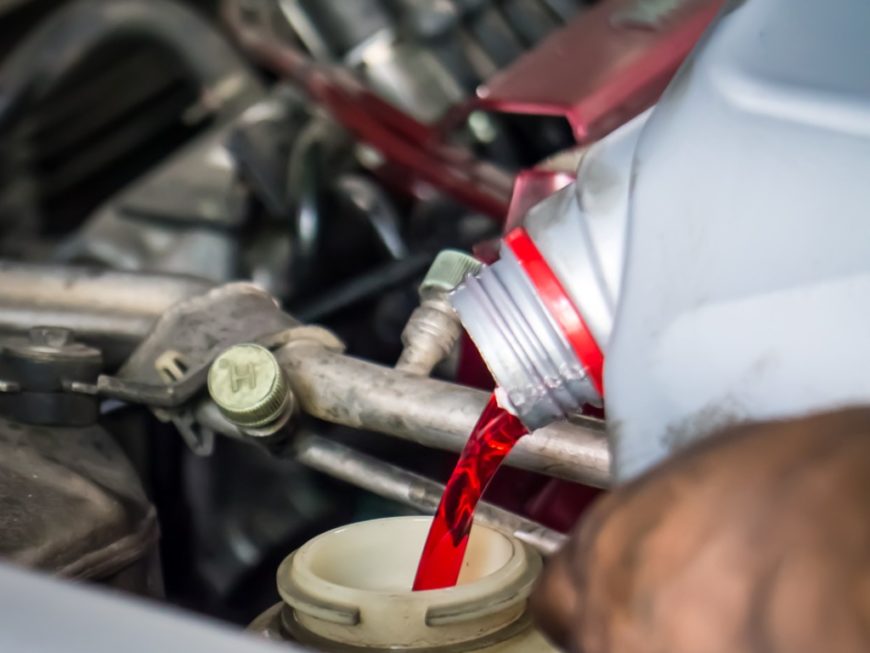As an Amazon Associate, I earn from qualifying purchases at no extra cost to you.
Is It Bad to Change Transmission Fluid? Discover the Truth!
Changing transmission fluid is not necessarily bad; in fact, it is recommended to maintain optimal performance and longevity of your vehicle’s transmission. Regularly changing the transmission fluid helps to remove contaminants and prevent damage to the transmission components, ensuring smooth gear shifts and preventing costly repairs in the future.

Credit: bikepacking.com
Understanding Transmission Fluid
Transmission fluid is an essential component of your vehicle’s transmission system. It plays a crucial role in lubricating the parts, regulating temperature, and ensuring smooth and efficient gear shifts. Understanding transmission fluid and its function is key to grasping why changing it is important for the overall health and performance of your vehicle.
What Is Transmission Fluid?
Transmission fluid is a specialized oil specifically formulated to meet the unique demands of the transmission system. It is usually a red or pink fluid that is thicker than engine oil and has a distinct odor. Its primary purpose is to lubricate the gears, bearings, and other moving parts within the transmission, minimizing friction and reducing wear and tear.
Role Of Transmission Fluid
The transmission fluid serves several critical functions in the transmission system:
- Lubrication: Transmission fluid prevents metal-to-metal contact between the various components in the transmission, reducing friction and heat generation.
- Cooling: It helps in dissipating heat generated due to the friction of moving parts, ensuring that the transmission operates within its optimal temperature range.
- Sealing: Transmission fluid creates a seal between the moving parts, preventing fluid leakage and maintaining the hydraulic pressure required for gear shifts.
- Cleaning: It acts as a detergent, removing debris, contaminants, and metal shavings that accumulate over time, preventing them from causing damage to the transmission.
- Preservation: Transmission fluid contains additives that help prevent oxidation, rust, and corrosion, thereby extending the lifespan of the transmission system.
Overall, transmission fluid plays a vital role in ensuring the longevity and proper functioning of your vehicle’s transmission. It is crucial to maintain the quality and level of the fluid by adhering to the manufacturer’s recommended service intervals and changing it when necessary. Ignoring or neglecting transmission fluid changes can lead to a variety of problems, including poor shifting, overheating, and even costly transmission repairs.

Credit: www.amazon.com
Importance Of Regularly Changing Transmission Fluid
Regularly changing transmission fluid plays a crucial role in maintaining the health of your vehicle’s transmission system. Neglecting this maintenance task can lead to issues such as poor shifting, increased wear and tear, and even transmission failure. Avoid potential problems by following the manufacturer’s recommended fluid change intervals.
Prevents Costly Transmission Repairs
Regularly changing transmission fluid is vital for the smooth operation and longevity of your vehicle’s transmission system. By maintaining clean and fresh transmission fluid, you can prevent costly repairs down the road. Over time, transmission fluid can become contaminated with dirt, debris, and metal particles. These contaminants can cause friction, leading to excessive wear and tear on the transmission components. As a result, irreversible damage can occur, requiring expensive repairs or even a complete transmission replacement.By adhering to a regular transmission fluid change schedule, you can protect your vehicle’s transmission system from unnecessary repairs. When the old fluid is drained and replaced with new fluid, it helps to flush out any contaminants and keep the transmission running smoothly. This simple maintenance task can potentially save you from the headache and financial burden of dealing with a malfunctioning or failed transmission.Improves Performance And Fuel Efficiency
Not only does regularly changing transmission fluid prevent costly repairs, but it also plays a crucial role in improving your vehicle’s performance and fuel efficiency. Transmission fluid acts as a lubricant, ensuring that all the moving parts inside the transmission function properly. Over time, this fluid can break down due to heat and friction, becoming less effective in its lubricating properties.When transmission fluid is old and worn out, it can result in increased friction and resistance within the transmission system. This can lead to sluggish gear shifts, delayed engagement, and overall reduced performance. Additionally, as the transmission works harder to compensate for the lack of proper lubrication, it can put a strain on the engine, leading to decreased fuel efficiency.By regularly changing the transmission fluid, you can maintain optimal lubrication levels within the transmission system. This allows for smoother gear shifts, improved acceleration, and enhanced overall performance. Moreover, with reduced friction and strain on the engine, your vehicle can achieve better fuel efficiency, ultimately saving on fuel costs in the long run.Don’t overlook the importance of regularly changing transmission fluid. By preventing costly repairs and improving performance and fuel efficiency, this simple maintenance task can go a long way in ensuring the longevity and reliability of your vehicle’s transmission system. So, make sure to schedule those fluid changes according to your vehicle manufacturer’s recommendations, and enjoy the peace of mind that comes with a healthy transmission.Debunking The Myth: Is It Bad To Change Transmission Fluid?
Changing transmission fluid is not bad, contrary to popular belief. Regularly changing the fluid helps prolong the life of your transmission, ensuring smooth shifting and optimal performance. Don’t fall for the myth, it’s important to keep your transmission fluid fresh.
Frequency Of Transmission Fluid Change
Changing transmission fluid is a topic that has sparked much debate among car enthusiasts. Some argue that changing the fluid too often can cause more harm than good, but is this really true? Let’s debunk this myth by understanding the frequency at which transmission fluid should be changed.Transmission fluid helps lubricate the moving parts of your car’s transmission system, enabling smooth shifting of gears and reducing friction and heat buildup. Over time, this fluid can break down and become contaminated with debris, which can affect the overall performance and longevity of your transmission.To maintain the health of your transmission, it is generally recommended to change the fluid every 30,000 to 60,000 miles, or as specified in your vehicle’s owner’s manual. This interval varies depending on the make and model of your vehicle, as well as your driving habits and conditions.Potential Risks And Benefits
Like any automotive maintenance procedure, changing transmission fluid does come with potential risks and benefits. Understanding these can help you make an informed decision about whether or not to incorporate regular transmission fluid changes into your vehicle maintenance routine.Potential Risks:1. Contaminant Removal: Changing the transmission fluid may dislodge accumulated contaminants, but it can also lead to them circulating within the system. However, this risk can be mitigated by using proper flushing techniques and high-quality fluid.2. Old Fluid Adaptation: Particularly in older vehicles, changing transmission fluid may cause the transmission to struggle to adapt to the new fluid’s different properties. This risk can be reduced by following the recommended fluid specifications.Potential Benefits:1. Improved Performance: Fresh transmission fluid helps maintain smooth and accurate shifting, reducing the strain on your transmission and improving overall performance.2. Extended Transmission Life: Regularly changing transmission fluid helps prevent excessive wear and tear, extending the life of your transmission and potentially saving you from costly repairs or even a full transmission replacement.3. Enhanced Fuel Efficiency: With clean and properly lubricated transmission components, your vehicle can operate more efficiently, resulting in improved fuel economy.In conclusion, the myth that changing transmission fluid is bad is just that – a myth. Regular maintenance and fluid changes are an essential part of keeping your transmission in optimal condition. By adhering to the recommended fluid change intervals and using the right techniques and high-quality fluid, you can enjoy the benefits of improved performance, extended transmission life, and enhanced fuel efficiency.
Credit: www.autozone.com
Frequently Asked Questions On Is It Bad To Change Transmission Fluid
Does Changing Transmission Fluid Damage Transmission?
Changing transmission fluid does not damage the transmission. It is a necessary maintenance procedure that helps improve the performance and longevity of the transmission. Regular fluid changes are recommended to ensure smooth shifting and prevent potential issues in the future.
Is It Better Not To Change Transmission Fluid?
Changing transmission fluid is important for optimal performance and longevity of your vehicle. Regularly replacing the fluid helps to remove contaminants and maintain proper lubrication, preventing costly transmission damage. It is recommended to follow your manufacturer’s guidelines and have the fluid changed at the recommended intervals to ensure smooth operation of your transmission.
Is It Safe To Change Transmission Fluid On High Mileage?
Yes, it is safe to change transmission fluid on high mileage vehicles. Regular fluid changes can help improve performance and extend the lifespan of your transmission. Be sure to follow the manufacturer’s recommended fluid type and change intervals for best results.
Can I Add New Transmission Fluid To Old?
No, it is not recommended to add new transmission fluid to old fluid. It is best to completely flush out the old fluid and replace it with fresh fluid. Mixing old and new fluid can cause damage to the transmission system.
Should I Change Transmission Fluid Regularly?
Yes, it’s important to change transmission fluid regularly to maintain optimal performance and longevity of your vehicle’s transmission system.
How Often Should I Change Transmission Fluid?
It’s recommended to change transmission fluid every 30,000 to 60,000 miles or as specified in your vehicle’s owner’s manual.
What Happens If I Don’t Change Transmission Fluid?
If you don’t change transmission fluid, it can lead to increased friction and heat, causing wear and tear on transmission components and potential failure.
Can I Change Transmission Fluid Myself?
While it’s possible to change transmission fluid yourself, it’s recommended to have it done by a professional to ensure proper procedures and the use of correct fluid.
Conclusion
Overall, it is important to understand that changing transmission fluid is crucial for maintaining the longevity and proper functioning of your vehicle’s transmission system. Neglecting this essential maintenance task can lead to a host of issues, such as decreased fuel efficiency and potential damage to transmission components.
As a responsible vehicle owner, it is recommended to follow the manufacturer’s guidelines and have your transmission fluid changed at the recommended intervals. By doing so, you can ensure smoother gear shifts, optimal performance, and extend the lifespan of your transmission.


